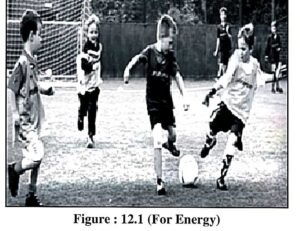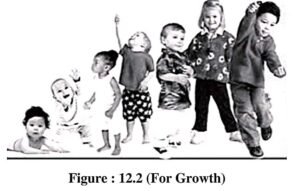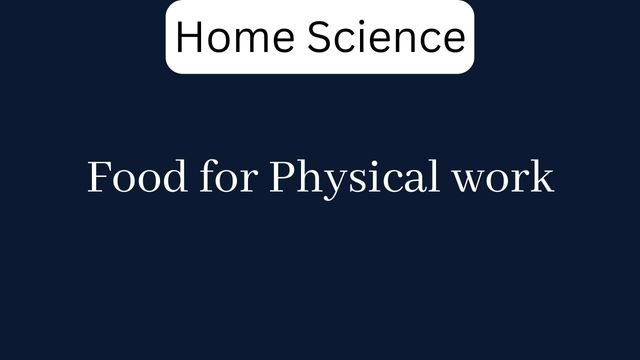Food for Physical work
Food for Physical work—
- The food that we eat becomes a part of our body. The main functions of food are physical growth & development, repair of damaged nerves, control and regulation of various activities, etc.
The role of food in various activities is as follows:
(i) Food provides energy to the body—
- Energy is required for various physical activities-walking, sitting, running, working, etc. even when we sleep our body organs work on their own performing breathing, digesting, and absorption activities. Energy is required for performing all these activities. And we take this energy from the food we eat. Fat and carbohydrates are the main sources of energy. They provide energy and so are called energy-giving foods. If needed, protein can also provide energy. 1 gram carbohydrate and protein gives 4 kilocalories and 1 gram fat gives 9 kilocalories. We should take energy from carbohydrates and fat because protein is essentially a formative nutrient.

(ii) Food helps in physical growth and development—
- Body is a developing biological unit which is made up of small cells; cell is the smallest unit of body. Our body is made of numerous cells. When foetus is in mother’s womb cells develop into tissues and body grows and develops. The process of body-building is active in infancy, childhood and adolescence. This is the reason why a child of 2.5kg-3.5 kg and 40-50 cm in length at the time of birth gains a weight of 50-75 kg and 5-6 feet in youth.
- When in mother’s womb, child receives nutrition from mother and after birth; he has to take food rich in nutritive elements by himself. The growth and development in children depends on balanced diet. In childhood, growth occurs at a rapid pace and so during this time nutritious and balanced diet is very essential. The food consumed during early years of life is essential to maintain health of the body. In the old age, formative nutritive elements are required in greater quantities because in this age cells and fibers are formed less but are damaged more. So energy providing foods are required less and protein, vitamins and mineral salt-rich food is required more.

(iii) Protection to the body against diseases and control of various body processes—
- Food provides protective power against diseases, keeps up the health and controls as well as regulates various functions of body. For example— control of body temperature, blood balance, acid-base balance, excretion, activation of enzymes, etc. the protective and regulatory functions carried out by various vitamins, mineral salts and water present in the food. Each of the elements is responsible for its own unique function in the body. If there is deficiency or over-sufficiency of any element disorder develops in the management of various processes and body gets afflicted with diseases. This in turn will adversely affect body’s growth and development. Body gets strength against diseases from these nutritive elements and therefore, these elements are also known as `protective elements’. Green leafy vegetables, other vegetables, fruits, milk, eggs, meat and fish are the main sources of these vitamins and mineral-salts. In addition to these sources, these nutritive elements are also found in lentils and cereals.
Home Science Latest Post :- Click Here
Important Points of Interrelationship Between Nutrition , Food and Health :-
- Air, water and food are 3 basic requirements for survival.
- Water included as a nutrient because it is essential for various activities of the body, for mainly proper balance and regulation of body temperature.
- All cereals like rice, wheat, maize, barley, millets, etc are main sources of carbohydrates.
- One gram fat gives 9 kilocalories. Ghee, oil, groundnuts, vegetable ghee, mustard oil, other oilseeds contain fat in adequate quantities.
- Protein is essential for cell formation and so, protein is known as ‘formative element’.
- Vitamins give body the strength to fight against diseases and thus consumption of vitamin-rich food is very important.
- 65% of our body is made of water.
- Carbohydrate should be 60-70% of our food while fat should be 20-30% and protein- 10¬15%.
- Food as far as possible should be prepared keeping in mind every choice of every member of the fovily.
- Food is just not a thing for eating but is a medium of displaying emotions, traditions and culture.
Interrelationship Between Nutrition , Food and Health Questions and Answers :-
(i) The main source of energy is:-
(a) Carbohydrates
(b) Protein
(c) Vitamin
(d) Water
Click to show/hide
Answer :- A
(ii) Which of the following is not a physical function of food—
(a) Energy providing
(b) Growth and development
(c) Providing peace
(d) Protective and regulatory functions
Click to show/hide
Answer :- C
3. Which of the following is formative element?
(a) Carbohydrates
(b) Protein
(c) Water
(d) Fat
Click to show/hide
Answer :- B
(iv) What % of water is present in human body?
(a) 65%
(b) 67%
(c) 63%
(d) 64%
Click to show/hide
Answer :- A
